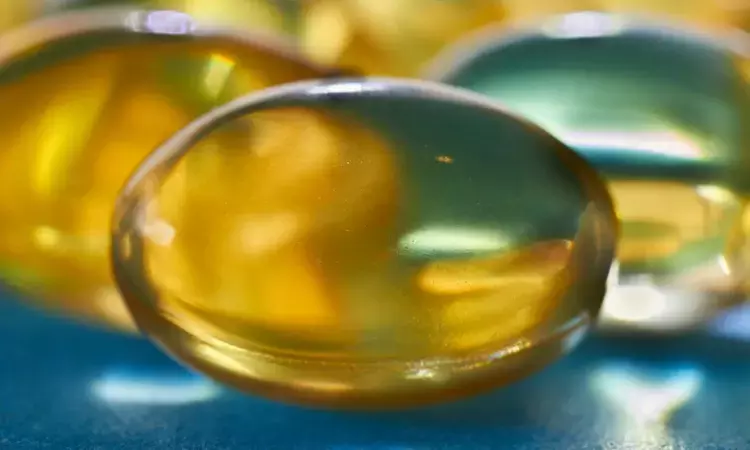- Home
- Medical news & Guidelines
- Anesthesiology
- Cardiology and CTVS
- Critical Care
- Dentistry
- Dermatology
- Diabetes and Endocrinology
- ENT
- Gastroenterology
- Medicine
- Nephrology
- Neurology
- Obstretics-Gynaecology
- Oncology
- Ophthalmology
- Orthopaedics
- Pediatrics-Neonatology
- Psychiatry
- Pulmonology
- Radiology
- Surgery
- Urology
- Laboratory Medicine
- Diet
- Nursing
- Paramedical
- Physiotherapy
- Health news
- Fact Check
- Bone Health Fact Check
- Brain Health Fact Check
- Cancer Related Fact Check
- Child Care Fact Check
- Dental and oral health fact check
- Diabetes and metabolic health fact check
- Diet and Nutrition Fact Check
- Eye and ENT Care Fact Check
- Fitness fact check
- Gut health fact check
- Heart health fact check
- Kidney health fact check
- Medical education fact check
- Men's health fact check
- Respiratory fact check
- Skin and hair care fact check
- Vaccine and Immunization fact check
- Women's health fact check
- AYUSH
- State News
- Andaman and Nicobar Islands
- Andhra Pradesh
- Arunachal Pradesh
- Assam
- Bihar
- Chandigarh
- Chattisgarh
- Dadra and Nagar Haveli
- Daman and Diu
- Delhi
- Goa
- Gujarat
- Haryana
- Himachal Pradesh
- Jammu & Kashmir
- Jharkhand
- Karnataka
- Kerala
- Ladakh
- Lakshadweep
- Madhya Pradesh
- Maharashtra
- Manipur
- Meghalaya
- Mizoram
- Nagaland
- Odisha
- Puducherry
- Punjab
- Rajasthan
- Sikkim
- Tamil Nadu
- Telangana
- Tripura
- Uttar Pradesh
- Uttrakhand
- West Bengal
- Medical Education
- Industry
Omega-3 fatty acids linked to increased attention scores and decreased impulsivity among adolescents

According to a new study Omega-3 fatty acids are associated with increased attention scores and decreased impulsivity in adolescents. Out of two main components of Omega 3 fatty acids, Docosahexaenoic acid (DHA) is linked to a greater capacity for selective and sustained attention in adolescents, while alpha-linolenic acid (ALA) is associated with lower impulsivity.
The study has been co-led by ISGlobal, a center supported by the "la Caixa" Foundation and the Pere Virgili Institute for Health Research (ISPV).
The results confirm the importance of having a diet that provides sufficient amounts of these polyunsaturated fatty acids for a healthy brain development. During adolescence, important structural and functional changes occur in the brain, especially in the prefrontal area, which plays a major role in controlling attention. On the other hand, omega-3 unsaturated fatty acids are known to be critical for proper brain development and function. The most abundant fatty acid in the brain, particularly in the prefrontal area, is DHA, which is mostly supplied by eating fatty fish.
"Despite the established importance of DHA in brain development, few studies have evaluated whether it plays a role in the attention performance of healthy adolescents," says Jordi Júlvez, IISPV researcher, ISGlobal research associate and coordinator of the study. "In addition, the possible role of alpha-linoleic acid (ALA), another omega-3 but of plant origin, has not been as extensively studied," he adds. This is relevant, given the low fish consumption in Western societies.
The purpose of this study was to determine whether a higher intake of DHA and ALA was associated with an increased attention performance in a group of 332 adolescents from different schools in Barcelona. The participants underwent computerized tests that measure reaction times in order to determine selective and sustained attention capacity, inhibition capacity in the face of distracting stimuli, and impulsivity. The adolescents also answered a series of questions on dietary habits and gave blood samples to measure red blood cell levels of DHA and ALA - an objective and valid indication of long-term dietary intake of these fats.
The results show that higher levels of DHA are associated with greater selective and sustained attention and inhibitory attention. In contrast, ALA was not associated with attention performance, but was associated with lower impulsivity. "The role of ALA in attention control is still unclear, but this finding may be clinically relevant, as impulsivity is a feature of several psychiatric conditions, such as ADHD," explains Ariadna Pinar-Martí, first author of the study.
"Our study indicates that dietary DHA most likely plays a role in attention-requiring tasks, but further studies are needed to confirm a cause-effect, as well as to understand the role of ALA," concludes Júlvez. In any case, the findings add to the already existing evidence on the benefit of consuming fatty fish (the main source of DHA) at a time when the brain is developing in its highest sophistication before reaching adulthood.
Reference:Pinar-Martí, A., Fernández-Barrés, S., Gignac, F. et al. Red blood cell omega-3 fatty acids and attention scores in healthy adolescents. Eur Child Adolesc Psychiatry (2022). https://doi.org/10.1007/s00787-022-02064-w
Dr Kamal Kant Kohli-MBBS, DTCD- a chest specialist with more than 30 years of practice and a flair for writing clinical articles, Dr Kamal Kant Kohli joined Medical Dialogues as a Chief Editor of Medical News. Besides writing articles, as an editor, he proofreads and verifies all the medical content published on Medical Dialogues including those coming from journals, studies,medical conferences,guidelines etc. Email: drkohli@medicaldialogues.in. Contact no. 011-43720751


